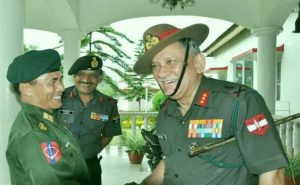 Janjivan Bureau / New Delhi: The Kargil conflict in the mountains of Jammu and Kashmir’s Ladakh region took place after Pakistani troops occupied Indian posts on the heights. It took about three months for the the Indian forces to recapture the posts. But in 1971, direct war between India- Pakistan was ended only in 13 days.
Janjivan Bureau / New Delhi: The Kargil conflict in the mountains of Jammu and Kashmir’s Ladakh region took place after Pakistani troops occupied Indian posts on the heights. It took about three months for the the Indian forces to recapture the posts. But in 1971, direct war between India- Pakistan was ended only in 13 days.
July 26 is celebrated as the anniversary of India’s victory in the 1999 Kargil conflict with Pakistan.
Prime Minister Narendra Modi today hailed the Indian armed forces for their prowess and sacrifices for the country on the occasion of ‘Kargil Vijay Diwas’.
“Remembering our brave soldiers who fought gallantly for the pride of our nation & the security of our citizens during the Kargil War,” Modi said in a series of tweets.
“Kargil Vijay Diwas reminds us of India’s military prowess & the great sacrifices our armed forces make while steadfastly keeping India safe,” he added.
Congress President Sonia Gandhi has paid rich tributes and expressed deep gratitude and respect for the Kargil martyrs and their family members. Saluting the courage and valour of the martyrs on Kargil Vijay Diwas, Smt. Gandhi said that the Nation is extremely proud of the brave soldiers who made the supreme sacrifices.
Defence Minister Arun Jaitley and the three Service chiefs today paid glowing tributes to armed forces personnel who laid down their lives in the Kargil war.
Jaitley accompanied by Army Chief General Bipin Rawat, Chief of the Naval Staff Admiral Sunil Lanba, and Air Chief Marshal Birender Singh Dhanoa, paid homage to Kargil war heroes at the Amar Jawan Jyoti here.
“Salute to the valour of our soldiers on #KargilVijayDiwas,” Jaitley tweeted on the occasion.
Kargil Vijay Diwas is observed on this day every year, marking successful conclusion of the war with Pakistan in the Kargil-Drass sector of Jammu and Kashmir in 1999.
The Indian soldiers successfully gained back the high altitude outposts occupied by Pakistani intruders culminating in Operation Vijay on the day.
Over 500 Indian armed forces personnel laid down their lives during the 60-day long war.
“Remembering our brave soldiers who fought gallantly for the pride of our nation and the security of our citizens during the Kargil War,” said Narendra Modi on Twitter.
Arun Jaitley also saluted the “valour of our soldiers” on Kargil Vijay Diwas.
Eighteen years since Kargil War was fought, the lessons learnt from it continue to be relevant even today.
Kargil was called a low-intensity conflict and a ‘limited war’ but it highlighted deficiencies in India’s intelligence and reinforced the need for a robust and forward-looking defence and logistics network.
Then Defence Minister George Fernandes at a conference on Asian security in January 2000 said that India has shown during the Kargil War that it can fight and win a limited war at a time and place chosen by the aggressor. The Kargil War lasted for more than 60 days.
Nearly two decades later when India is engaged in a standoff with China on Doklam even as its relations with Pakistan continue to be fragile, the concerns about India’s battle-readiness remain.
The Lahore Declaration in February 1999 was a step forward in improving the India-Pakistan relations. Months later, the Kargil War started in May.
The Kargil War showed that bilateral treaties and security don’t always go together.
While then Prime Minister Atal Bihari Vajpayee engaged with his Pakistani counterpart Nawaz Sharif for bilateral talks, several analysts believed that the war was in the making ever since Pervez Musharraf took over as Pakistan Army chief in October 1998.
While Nawaz Sharif’s claims that he did not know about his army’s plans are debatable, the realities on the ground have changed little in terms of the all-powerful army still calling the shots in Pakistan.

















